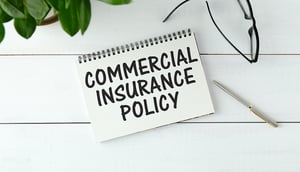Similar to legal malpractice suits, uncovered medi...
 Every business is unique even when compared to other businesses in a similar industry. For that reason, commercial insurance is designed to offer the specific types of insurance businesses need.
Every business is unique even when compared to other businesses in a similar industry. For that reason, commercial insurance is designed to offer the specific types of insurance businesses need.
According to the Insurance Information Institute, there were over $200 million in commercial claims in 2022, and the numbers have been rising. This is why every business needs commercial insurance.
We’ll provide a brief overview of what you need to know about commercial insurance, outline various types of commercial insurance, highlight industry-specific insurance, and give you insight into how to choose the right commercial insurance policies.
Unlike home or auto policies, commercial insurance policies are not all-inclusive. Business owners generally need two or more commercial policies. Each type of coverage protects against specific perils and covers specific types of losses.
The Insurance Information Institute states that commercial insurance plays a vital role in the world economy as it protects businesses against failure.
Each policy specifies the maximum coverage limits and the deductibles that apply to various types of losses. The premiums are based on the level of risk and other factors.
The exclusions vary between policies, and policyholders should review their policies carefully to understand what is and isn’t covered. Two of the primary exclusions are earthquakes and flooding.
Commercial insurance can be confusing for business owners, and insurance agents and brokers can help business owners understand coverages and policy wordings.
If you have an insurance need, you can nearly always find an insurance policy to fill it. Six basic types of commercial insurance policies are common to many types of businesses.
Property insurance protects your business’s physical assets. The coverage includes your buildings, contents inside the building, and loss of business income. Among other things, commercial property insurance protects your business computers, equipment, furniture, tools, exterior signs, fences and landscaping, important documents, inventory, and more.
Inland marine insurance is a specific type of property insurance that covers products, materials, and equipment that are regularly transported across the land such as contractor’s equipment or products.
Boiler and machinery insurance covers losses to the sudden and accidental breakdown of equipment such as air conditioning and refrigeration systems, pumps, and compressors.
Liability insurance, also known as commercial general liability insurance (CGL), protects businesses from claims of bodily injury, property damage, slander, and false advertising. Liability insurance pays for damage caused by a business, its services, its operations, and its employees.
Professional liability insurance is a specific type of liability insurance that protects professionals such as accountants, physicians, and anyone else who provides expertise or advice. The policy pays when a professional makes a mistake, is negligent, or omits important information.
Product liability insurance protects businesses from claims that a product they made or sold caused property damage to someone else’s belongings or caused an injury or illness.
A business may be forced to close or relocate temporarily in the event of some type of loss. Business interruption insurance will pay for the loss of income a business sustains until it can reopen for business. It will also pay the extra expenses needed to temporarily relocate the business. FEMA states that around 25% of businesses cannot reopen after they’ve experienced a disaster and business interruption insurance provides the finances to keep businesses sustainable.
Workers’ compensation coverage is mandated in nearly every state for certain types of workers. This coverage protects workers who become ill or injured while on the job. Workers’ compensation policies provide partial lost wages, medical costs, rehabilitation costs, and job training.
Commercial auto insurance pays for losses to business-owned vehicles being used for business purposes even if the vehicles are privately owned. It pays for losses when a business vehicle is involved in an accident.
Cyber insurance, also known as cyber liability, covers losses due to a data breach or other cyber security issues. It covers the cost of forensic investigations, regulatory expenses, cyber extortion, business interruption, crisis management expenses, litigation expenses, and more.

Certain industries have unique needs that aren’t covered under the basic types of insurance listed above. Here is a small sampling of various types of industry-specific coverages:
For example, specialized insurance for tree care services, landscaping services, and construction companies may include features such as boom exposures, snow and ice removal, or pollution cleanup. Healthcare insurance may include malpractice insurance, and agriculture insurance may include crop insurance, farm insurance, and protection for animals.
There are several important considerations when choosing the right commercial insurance policies including evaluating your needs, assessing risks, and comparing providers.
An insurance broker or agent is the best resource for helping you choose the right commercial insurance policies. They can help you with analyzing your risk profile and assessing your insurance needs as well as provide you with ongoing risk management services. Brokers and independent agents have access to multiple companies to help you get the best rates possible.
Depending on the type of business you run, commercial insurance may not be required, yet purchasing the proper commercial insurance policies makes good business sense in every industry.
Contact one of our licensed commercial insurance agents at the Leap Carpenter Kemps Insurance Agency to learn more about customized insurance policies that are tailor-made for your business at 209-384-0727 today!
Similar to legal malpractice suits, uncovered medi...
You get all the benefits and advantages of being a...
Natural disasters and crimes can impact a business...
Leap | Carpenter | Kemps Insurance Agency provides Commercial Business Insurance, Employee Benefits, Life and Health Insurance, and Personal Insurance to all of California, including Merced, Atwater, Los Banos, Mariposa, Madera, Fresno, Modesto, Turlock, and Stockton.
CA License Number 0646081 | Licensed to do business in California, Arizona, Hawaii, Idaho, Montana, Nevada, North Carolina, Oklahoma, Oregon, Virginia, West Virginia and Washington.
© Copyright 2023 Leap | Carpenter | Kemps Insurance Agency — Privacy Policy | Terms & Conditions.
Merced Office
3187 Collins Drive
Merced, CA 95348
Phone: (209) 384-0727
Additional Contacts
Toll Free: (800) 221-0864
Fax: (209) 384-0401